
The paradise tanager is a brilliantly multicolored, medium-sized songbird whose length varies between 13.5 and 15 cm. It has a light green head, sky blue underparts and black upper body plumage. Depending on subspecies, the behind is yellow and red or all red. The beak is black and the legs are grey. It is native to the Amazon rainforest.
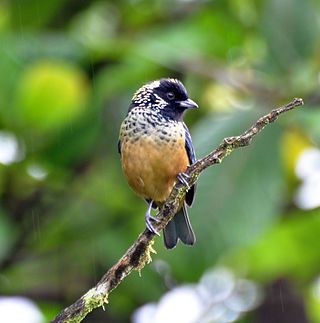
The spangle-cheeked tanager is a medium-sized passerine bird. This tanager is an endemic resident breeder in the highlands of Costa Rica and western Panama.

The silver-throated tanager is a species of passerine bird in the tanager family Thraupidae. It is found in Costa Rica, Panama, Colombia, Ecuador, and northeastern Peru. It inhabits mossy forests, montane evergreen forests, tropical lowland evergreen forests and forest edges, along with tall secondary forests and disturbed habitat with remnant trees and forest. It is 13 centimetres (5.1 in) long and weighs 22 grams (0.78 oz) on average, and shows slight sexual dimorphism, with duller female plumage. Adult males are mainly bright yellow, with a silvery-white throat bordered above with a black stripe on the cheeks, black streaking on the back, and green edges to the wings and tail. Juveniles are duller and greener.

The fawn-breasted tanager is a species of tanager with a blue head and yellow breast. It occurs in the Andes of northwestern Argentina, Bolivia, Colombia, Ecuador, Peru and Venezuela, as well as in the highlands of northeastern Argentina, south Brazil, Paraguay and Uruguay.
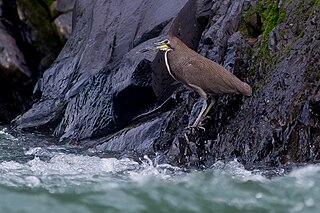
The fasciated tiger heron is a species of heron in the family Ardeidae. It is present in southern Central America and parts of northern and central South America, where its natural habitat is rivers.

The masked flowerpiercer is a species of bird in the tanager family, Thraupidae. It is found in humid montane forest and scrub in Venezuela, Colombia, Ecuador, Peru and Bolivia. Flowerpiercers got their name from the fact that they have a sharp hook on the tip of their upper mandible which they use to slice open the base of flowers to get at the nectar.

The black-chested fruiteater is a species of bird in the family Cotingidae found in Colombia, Ecuador, and Peru, mostly on the eastern side of the Andes. Its natural habitat is subtropical and tropical moist montane forests and the IUCN lists its status as being of "least concern".

The white-winged tanager is a medium-sized American songbird in the family Cardinalidae, the cardinals or cardinal grosbeaks. It is found from Mexico, through Central America, across northern South America and as far south as Bolivia.

The red-hooded tanager, is a medium-sized American songbird in the family Cardinalidae, the cardinals or cardinal grosbeaks. It is found in Colombia, Ecuador, and Peru.

The masked crimson tanager is a species of bird in the family Thraupidae. It is found in Bolivia, Brazil, Colombia, Ecuador, and Peru. Its natural habitats are subtropical or tropical swamps and subtropical or tropical moist shrubland.
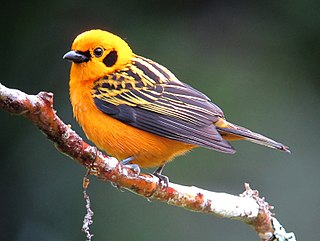
The golden tanager is a species of bird in the family Thraupidae. It is widespread and often common in highland forests of the Andes and Venezuelan Coastal Range in north-western South America.
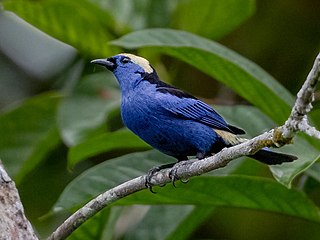
The opal-crowned tanager is a species of bird in the family Thraupidae, the tanagers. It is one of 49 species in the genus Tangara.
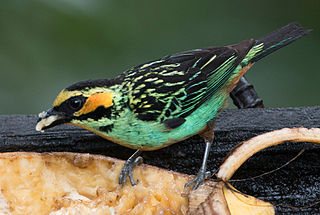
The golden-eared tanager is a species of bird in the tanager family Thraupidae. It is found in the eastern Andes of Bolivia, Colombia, Ecuador and Peru where its natural habitat is subtropical or tropical moist montane forests.

The emerald tanager is a species of bird in the tanager family Thraupidae. It is found in Colombia, Costa Rica, Ecuador, and Panama. Described by the English ornithologists PL Sclater and Osbert Salvin in 1869, it is a medium-sized species that has a length of 10.6–13 cm (4.2–5.1 in) and a mass of 18–20.5 g (0.63–0.72 oz). It can be identified by its bright green plumage, with black streaking on the back and wings, and a black auricular patch and beak. It also has yellow on the crown and rump. The species shows slight sexual dimorphism, with the females being duller and having yellow-green in place of yellow on the head.

The black-capped tanager is one of the many species of Neotropical bird in the family Thraupidae. It lives in mountains of Ecuador, Colombia and Venezuela year-round. This bird can often be found in open landscapes, alone or in pairs, hiding under branches of trees and bushes. Its natural habitats are subtropical or tropical moist montane forests and heavily degraded former forest.
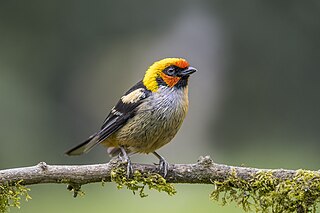
The flame-faced tanager is a species of bird in the tanager family Thraupidae. It is endemic to South America and is found in the eastern Andes of Colombia, Ecuador, Peru and Venezuela. Its natural habitat is subtropical or tropical moist montane forests. It is a distinctive-looking species with black and opalescent green upperparts, opalescent green and buff underparts, and a deep red and yellow face. The subspecies lunigera lacks the deep red on the face, which is replaced with orangish-red.

The golden-naped tanager is a species of bird in the tanager family Thraupidae. It is found in South America from Colombia to Bolivia. Its natural habitats are subtropical or tropical moist montane forests and heavily degraded former forest.

The green-and-gold tanager is a species of bird in the family Thraupidae, the tanagers. It is one of 27 species in the genus Tangara.

The blue-and-black tanager is a species of bird in the tanager family Thraupidae. It is found in the Andes of Bolivia, Colombia, Ecuador, Peru and Venezuela, where it inhabits montane evergreen forest, dwarf forest, and secondary forest at elevations of 1,500–3,500 m (4,900–11,500 ft). It inhabits the highest altitude of any Tangara species, and is the only species from the genus that is found near the tree line. Adults are 13 cm (5.1 in) long and weigh 18 g (0.63 oz) on average, and are mostly blue with black masks, wings, and tails. The species shows slight sexual dimorphism, with females being slightly duller than males.

The saffron-crowned tanager is a species of bird in the family Thraupidae. Found in the northern Andes of Bolivia, Colombia, Ecuador, Peru, and Venezuela, it inhabits cloud forest, forest edges, and secondary forest, preferring areas with mossy trees. It is an average-sized species of tanager with a blue-green body and yellow head with a black forecrown, lores, orbital area, and chin.






















